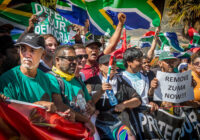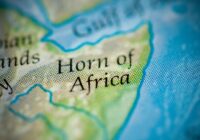Sudan shows how granting more freedoms for refugees to legally live, study and work can yield great results in a country with its own troubled past.
Syrians have found refuge in an unexpected place: the Republic of Sudan. The streets of Sudan’s capital, Khartoum, are bustling with new Syrian restaurants, bakeries and sweets shops. One shop, Anas’ Shwarma, opened in 2014, and employs over 40 Syrian refugees who fled the war. Sudan, whose own civil war created millions of refugees, is now a top destination country for many fleeing the conflict in Syria. Today, the Syrian community has grown to 100,000 according to Sudan’s Commission of Refugees, while other estimates place that number at 250,000. It is Sudan, not the wealthy countries of the West, that is providing a model for alleviating the Syrian refugee crisis.
Sudan’s refugee population has been growing since the 1990s, which is no surprise given its shared border with Eritrea and the ongoing civil war in the now independent South Sudan. But what is prompting distant Syrians to seek refuge there today?
Sudan is currently the only country in the world that allows Syrians to enter without a visa and without imposing restrictions when they arrive. This has made Sudan a top choice for Syrian refugees. According to Usamah Mohamed, a Sudanese writer based in Khartoum, “Syrians appear to feel welcomed; they had no issues integrating in society.”
Not only has the Sudanese government kept the visa-waiver program, but it also granted Syrians the right to work and education. This means that any Syrian can enroll in a public Sudanese school or college and apply to jobs without needing a permit. In Lebanon, many Syrians have to pay an annual residency fee of $200 if they are not registered with the United Nations High Commissioner for Refugees (UNHCR). In Turkey, getting a work permit is difficult, with less than 14,000 of the 3 million Syrian refugees being able to obtain one.
Syrians may have the right to work in Sudan, but it doesn’t mean they can find jobs easily. Opportunities are limited, and Sudan’s unemployment rate is about 20%. But Syrians have been entrepreneurial. According to Noaman Madibbo, a Sudanese student at George Washington University who spent the summer in Khartoum, “Syrians who come to Sudan are very industrious. They started working in trade or crafts. Many work as construction workers, plumbers, tailors, and carpenters. Many more opened up restaurants and bakeries, especially in the capital city.” Madibbo’s grandfather runs a travel agency and assures that “business is booming,” with two weekly flights from Damascus to Khartoum.
Sudan is both a destination and a transit point for many Syrians. Some stay briefly en route to Egypt or even to Europe by crossing from Sudan to Libya. Sudan has offered a citizenship track for any Syrian who has resided in the country for over six months. According to one estimate, over 1,000 Syrians have obtained Sudanese citizenship. Having a Sudanese passport can be incredibly valuable to Syrian refugees as it allows them to travel more freely since many countries have stopped issuing them visas.
Why has Sudan adopted such an open-door policy for Syrians?
Well, according to Noaman, “It’s good PR.” He explains that the government has been praised by some in the international community for its hospitality to Syrians and for the freedoms it grants them. Another Sudanese activist using the pseudonym Maryam A. agrees with Noaman, explaining that “the Syrian crisis is under the spotlight right now and, therefore, Sudan wants to look good on an international level as a supporter of the Syrian people, in hopes that the [Darfur] sanctions will be eased eventually.”
The Sudanese government has long been criticized for neglecting internally displaced refugees in Darfur and other regions in the country. Providing these rights to Syrians is an attempt to exhibit to its citizens and the international community that Sudan is acting in good faith to protect the rights of at least some refugees.
When I asked Usamah Mohamed about the Sudanese reaction to the growing Syrian presence in Sudan, he answered that “it’s been a mixed bag. There’s a certain sense of welcoming hospitality, but a growing sentiment of xenophobia is also present. On social media, Sudanese [citizens] often complain of the economic cost against which hosting such large number of refugees may affect their already hard lives.”
There has been a debate in Sudanese media on whether it’s fair to offer Syrians free services such as health insurance. According to Maryam, many are unhappy about this and argue that “the subsidized medication these refugees are getting is part of a system Sudanese citizens have been paying for, and that’s unfair.” Usamah pointed out that the non-democratic government did not consult its citizens on the decision to receive Syrians, and “as long as citizens feel disenfranchised, they would not welcome their government’s acts of charity toward foreigners. But to give credit where it’s due, most ordinary people are welcoming of Syrians.”
In 2016, the UNHCR granted Sudan $10 million to support Syrian refugees, compared to $58 million given to Egypt, which hosted a comparable population of 100,000 Syrian refugees in the same year. It is worth noting that most Syrians in Sudan are not designated by the Sudanese government as refugees but more like residents with a set of legal rights. This amount may help improve the country’s capacity to aid refugees, but more can be done. Sudan hosts over 2 million refugees, most of them coming from neighboring African countries.
The story of Sudan, a poor country hosting millions of refugees when its own economic conditions are dire, is in fact a common one. The UNHCR found that most displaced people in 2015 and 2016 found shelter in poor or middle-income countries. While much attention has been given to the influx of refugees to Europe, efforts to help low and middle-income countries improve their capacity to aid refugees can go a long way. Other countries can learn from the Sudanese experience that illustrates how granting more freedoms for refugees to legally live, study and work can be empowering and can yield great results even in country with its own troubled past.
*[Young Professionals in Foreign Policy is a partner institution of Fair Observer. This article was updated on November 1, 2017, at 22:08 GMT.]
The views expressed in this article are the author’s own and do not necessarily reflect Fair Observer’s editorial policy.
Photo Credit: hecke61 / Shutterstock.com
Support Fair Observer
We rely on your support for our independence, diversity and quality.
For more than 10 years, Fair Observer has been free, fair and independent. No billionaire owns us, no advertisers control us. We are a reader-supported nonprofit. Unlike many other publications, we keep our content free for readers regardless of where they live or whether they can afford to pay. We have no paywalls and no ads.
In the post-truth era of fake news, echo chambers and filter bubbles, we publish a plurality of perspectives from around the world. Anyone can publish with us, but everyone goes through a rigorous editorial process. So, you get fact-checked, well-reasoned content instead of noise.
We publish 2,500+ voices from 90+ countries. We also conduct education and training programs
on subjects ranging from digital media and journalism to writing and critical thinking. This
doesn’t come cheap. Servers, editors, trainers and web developers cost
money.
Please consider supporting us on a regular basis as a recurring donor or a
sustaining member.
Will you support FO’s journalism?
We rely on your support for our independence, diversity and quality.







